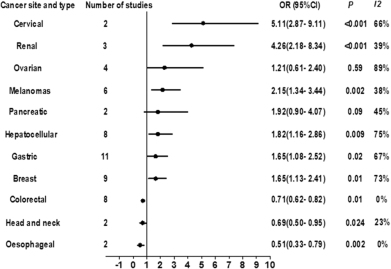Regulatory T cells, or Tregs, are immune cells that are typically considered bad news for cancer patients. That’s because these cells are immunosuppressive, and can prevent the patient’s own immune cells from attacking and clearing their tumour. Essentially, the Tregs are recruited by the tumour to act as a protective shield.
Yet new research from scientists in China suggests that Tregs aren’t always bad. In some cancers, the presence of many Tregs in the tumour can actually correlate with improved survival.

Taken directly from their new paper, the risk graph above shows that patients with cervical, renal, skin, liver, gastric and breast tumours that were densley packed with FoxP3+ Tregs had a significantly shorter overall survival (their odds of survival, which is numerically considered along the horizontal axis, was lower). Yet increased infiltration of FoxP3+ Tregs was associated with an improvement in the odds of survival for patients with colorectal, head and neck, and oesophageal cancer.
Image credit: Shang et al. 2015.
Repost from the Stojdl Lab blog.




